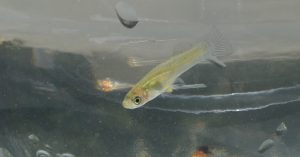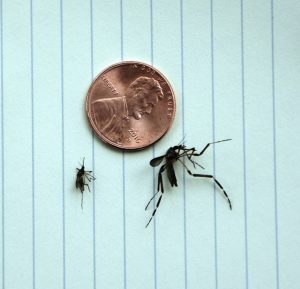
By Les Harrison
Wakulla County Extension Director
The consistent and ample rains of late over Florida’s panhandle assure enough moisture is available for home gardens and landscapes as well as agricultural production. It has also minimized, if not eliminated, the need for irrigation and its associated cost for all of the above
As with anything good, there is always an associated negative component which cannot be easily avoided. In other words there is a lead lining to every silver cloud.
In the case of sufficient rain, there will be mosquitos in areas where water stand for any length of time. For the residents of Wakulla County that covers most of the local geography.
Insect repellants and covering exposed skin are not an option currently for anyone who wishes to resist these ravenous pests. Fortunately, there are water-borne native species which provide some balance to this aerial harasser.
Gambusia holbrooki, commonly known as Eastern Mosquitofish, are a valuable resource for controlling mosquito and midge populations in ponds and other bodies of water. Their diet is not exclusively mosquito larvae, but enough so to make them very helpful in reducing the population if the fish are present in sufficient numbers.
These pint-sized predators consume mosquito larvae during all phases of their life. If the insect larvae are not present in the Mosquitofish’s environment, this tiny fish with a tiger shark’s attitude will aggressively seek out other dining options, including its own species.
Meal choices frequently include other insect larvae and tiny invertebrates which happen to stray into their vicinity, but mosquito larvae are the preferred selection.
This micro-sized hunter is capable of eating more than the equivalent of its own body weight in mosquito larvae on a daily basis. Mature females of this specie literally eat hundreds of the developing pest each day.
Mosquitofish are small, less than three inches at maturity and of a dull grey coloring. This mundanely camouflaged native fish seem less susceptible to wading bird predation than brightly colored fish or amphibians which also dine on mosquitoes or their larvae.
Mosquitofish are usually found in very shallow water, and for a good reason. Despite their agility and aggressive nature, they are prime targets for larger fish looking for a quick snack.
Their diminutive size and delicate appearance notwithstanding, they survive and prosper in inhospitable environments which would kill other freshwater species. Mosquitofish can survive in water with low oxygen concentrations, high salt content, and temperatures over 100 degrees Fahrenheit for brief periods.
This animal can begin reproduction at about two months of age, depending on the water temperature. Females can lay between two and six broods per season, with the potential of 60 hatch-lings produced on average.
The Easter Mosquitofish is available at many fish hatcheries in the panhandle. Given their popularity this time of year, it is advisable to call and confirm inventory availability before making a trip.
It seems just that stealthy airborne pest receive silent destruction from the murky shallows below. If only there were more mosquito fish.

To learn more about Eastern Mosquitofish in Wakulla County, contact your UF/IFAS Wakulla Extension Office at 850-926-3931 or https://blogs.ifas.ufl.edu/wakullaco/
 0
0
